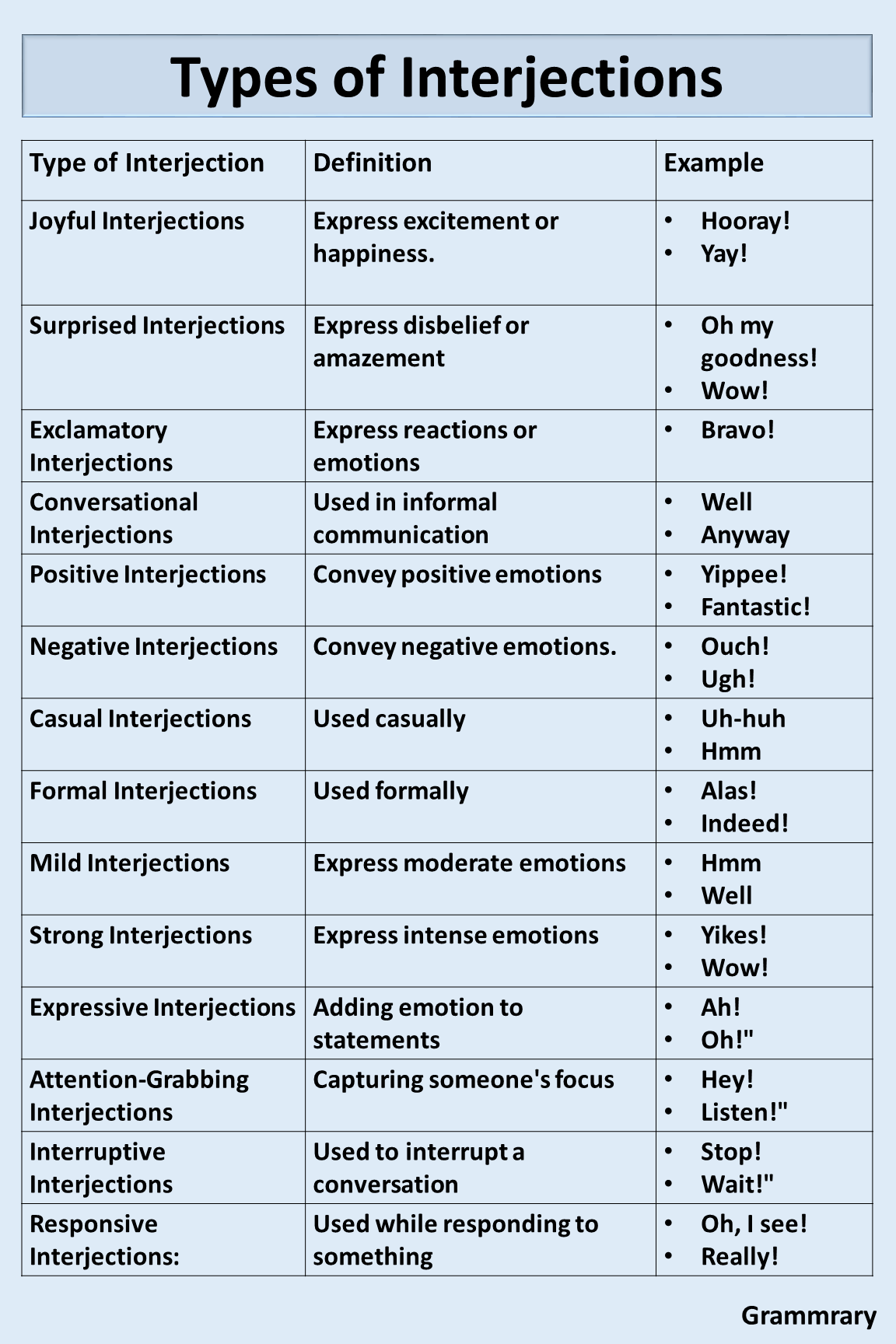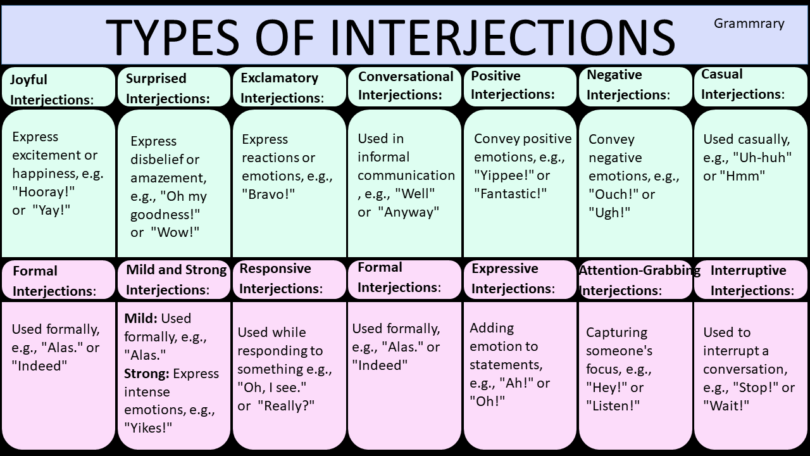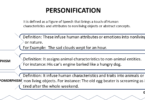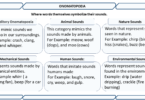Let’s explore Types of Interjections and their use in English Grammar. Have you ever wondered if there is any part of speech which is not grammatically connected to the other parts of speech? It is an interjection and is very common in everyday life.
The interjection is a part of speech that is not grammatically linked to other parts of speech.
Interjections:
Interjections express emotions, sentiments or reactions. They can be used separately or can be used with an exclamatory mark. Interjections convey emotional responses including joy, surprise, frustration, or approval.
Interjections and other parts of speech can be differentiated, interjections aren’t linked to Grammatical Rules.
Examples of interjections:
- Wow!
- Oops!
- Yikes!
- Alas!
- Ah!
- Phew!
- Hmm.
- Bravo!
- Oh!
- Hurray!
- Huh?
- Eureka!
- Shh!
- Ouch!
- Aha!
- Yay!
- Gosh!
- Boo!
- Ugh!
- Hooray!
Use of Interjections in sentences:
- Wow! This dish is very delicious.
- Yikes! The exam is tomorrow and I haven’t prepared for it yet.
- Bravo! She delivered a perfect presentation in the meeting.
- Ah! This cup of coffee with cake is exactly what I wanted today.
- Hurray! We finally won the competition.
- Oh no! I forgot to prepare my quiz.
- Alas! We missed the class.
- Phew! She missed her flight.
- Well! You did it in perfect way ever.
Types of Interjections:
Following are Types of interjections on Emotional Basis:
Surprised Interjections:
It express amazement or disbelief. For example: Oh my goodness! or Wow!
Joyful Interjections:
Express excitement or happiness, e.g.,”Hooray!” or “Yay!”
Here are Types of interjections on basis of Function:
Conversational Interjections:
It is used in informal communication. For example: Well or Anyway etc.
Exclamatory Interjections:
These express emotions or reactions. For example: Bravo!
Interjections, A Source of Emotion:
Positive Interjections:
It convey positive emotions. For example: Yippee! or Fantastic!
Negative Interjections:
These convey negative emotions. For example: Ouch! or Ugh!
Here are Types of Interjections on basis of Context:
Formal Interjections:
These are used formally. For example: Alas or Indeed
Casual Interjections:
It is used casually. For example: Uh-huh or Hmm!
Types of Interjections on basis of Intensity:
Strong Interjections:
These express intense emotions. For example: Yikes! or Wow!
Mild Interjections:
It express moderate emotions. For example: Hmm or Well
Classification on basis of Purpose:
Expressive Interjections:
Adding emotion to statements, e.g., “Ah!” or “Oh!”
Attention-Grabbing Interjections:
Capturing someone’s focus, e.g., “Hey!” or “Listen!”
Use of interjections in Dialogue:
Interruptive Interjections:
Used to interrupt a conversation, e.g., “Stop!” or “Wait!”
Responsive Interjections:
Used while responding to something e.g., “Oh, I see.” or “Really?”
Interjections can also be classified as:
- Primary interjections
- Secondary interjections
- Volitive interjections
- Emotive interjections
- Cognitive interjections
- Greetings and parting words
Let’s classify some interjections:
Joyful Interjections:
- Hooray!
- Yay!
- Woo-hoo!
- Yahoo!
- Yippee!
Surprised Interjections:
- Wow!
- Ah!
- Oh!
- Ooh!
- Aha!
Pain/Displeasure Interjections:
- Ouch!
- Ugh!
- Ow!
- Ew!
- Yikes!
Approval Interjections:
- Bravo!
- Excellent!
- Fantastic!
- Well done!
- Awesome!
Frustration Interjections:
- Argh!
- Ugh!
- Oh no!
- Darn!
- Oh no!
- Drat!
Greeting Interjections:
- Hello!
- Howdy!
- Hey!
- Hi!
- Greetings!
Farewell Interjections:
- Adieu!
- Goodbye!
- See you!
- Farewell!
- Bye-bye!
Agreement Interjections:
- Yes!
- Affirmative!
- Indeed!
- Absolutely!
- Sure!
Disapproval Interjections:
- Boo!
- Nonsense!
- Hiss!
- Bleh!
- Bah!
Inquiry Interjections:
- Huh?
- Hmm?
- Really?
- What?
- Why?
Expressive Interjections:
- Good gracious!
- Oh my!
- Oh dear!
- My goodness!
- Mercy!
Conversational Interjections:
Examples of Conversational Types of Interjections are written below:
- Anyway
- Well
- So
- Uh-huh
- Like
Let’s explore some more examples of interjections:
Here are Examples of some Types of Interjections:
- Oh dear!
- All right!
- Here we go!
- Come on!
- Well done!
- Oh no!
- What’s up?
- No way!
- Good grief!
- I don’t know!
- I guess so.
- I don’t care!
- It depends!
- Let’s go!
- That’s enough!
- What the heck!
- As if!
- So what!
- By the way.
Tabular Representation of Types of Interjections:
| Type of Interjection | Definition | Example |
| Joyful Interjections | Express excitement or happiness. | •Hooray! •Yay! |
| Surprised Interjections | Express disbelief or amazement | •Oh my goodness! •Wow! |
| Exclamatory Interjections | Express reactions or emotions | •Bravo! |
| Conversational Interjections | Used in informal communication | •Well •Anyway |
| Positive Interjections | Convey positive emotions | •Yippee! •Fantastic! |
| Negative Interjections | Convey negative emotions. | •Ouch! •Ugh! |
| Casual Interjections | Used casually | •Uh-huh •Hmm |
| Formal Interjections | Used formally | •Alas! •Indeed! |
| Mild Interjections | Express moderate emotions | •Hmm •Well |
| Strong Interjections | Express intense emotions | •Yikes! •Wow! |
| Expressive Interjections | Adding emotion to statements | •Ah! •Oh!” |
| Attention-Grabbing Interjections | Capturing someone’s focus | •Hey! •Listen!” |
| Interruptive Interjections | Used to interrupt a conversation | •Stop! •Wait!” |
| Responsive Interjections: | Used while responding to something | •Oh, I see! •Really! |

Types of Interjections with Definition and Examples







